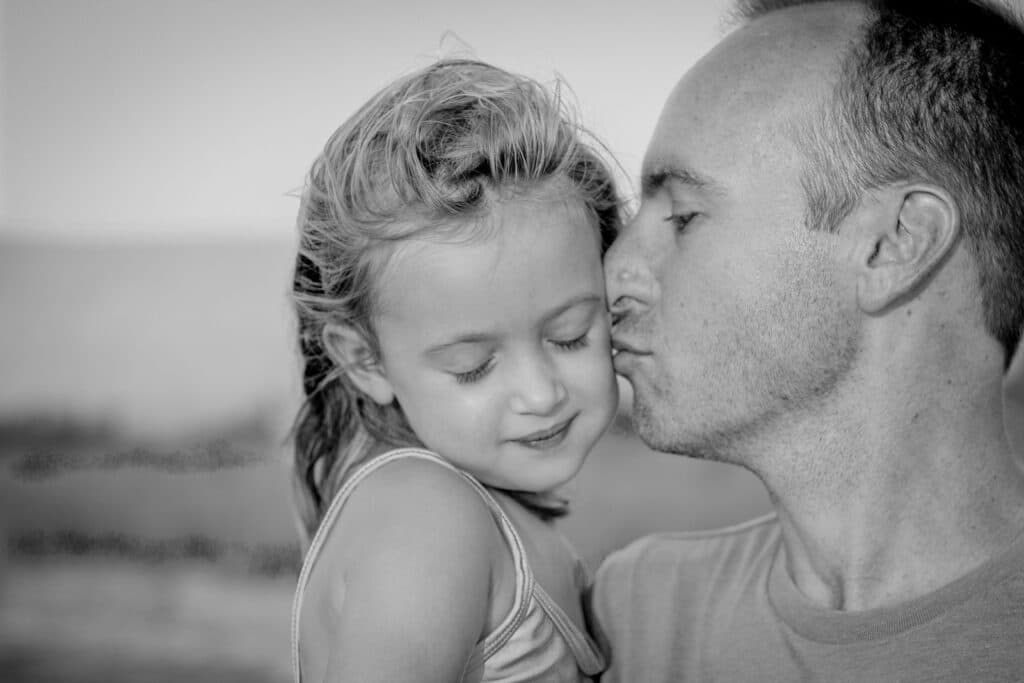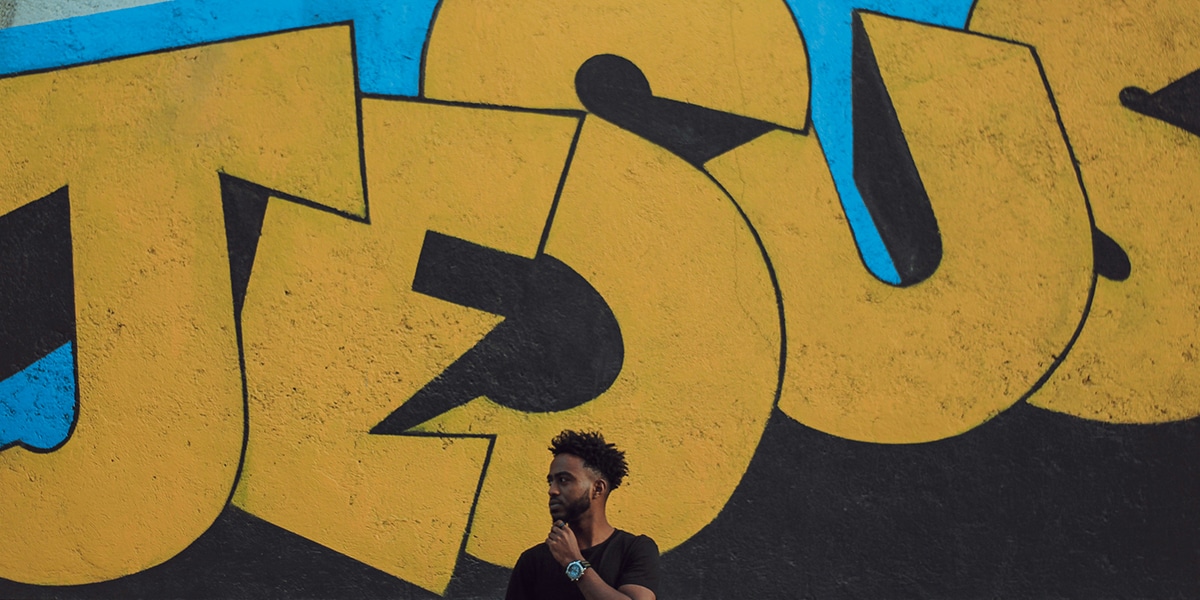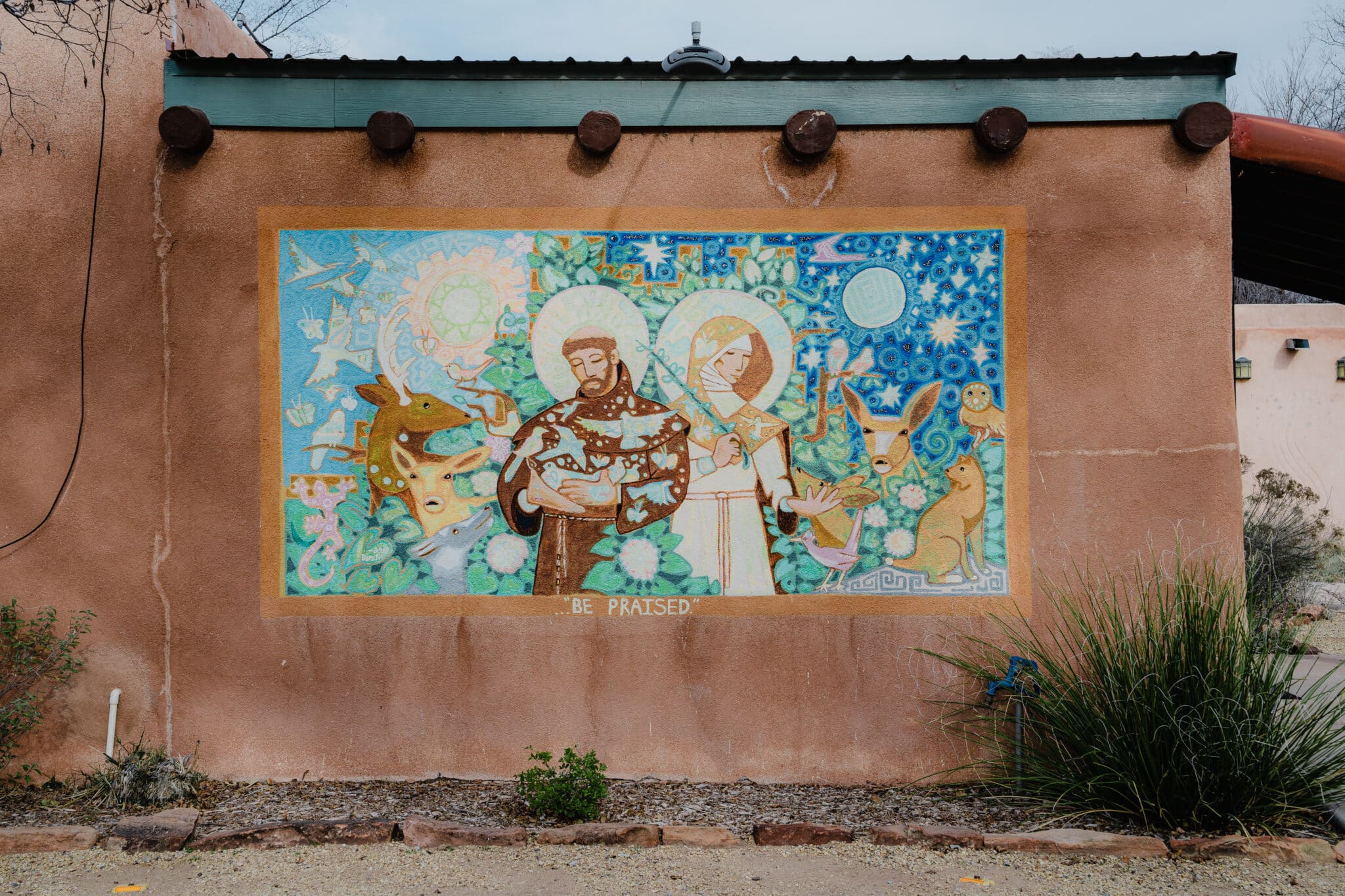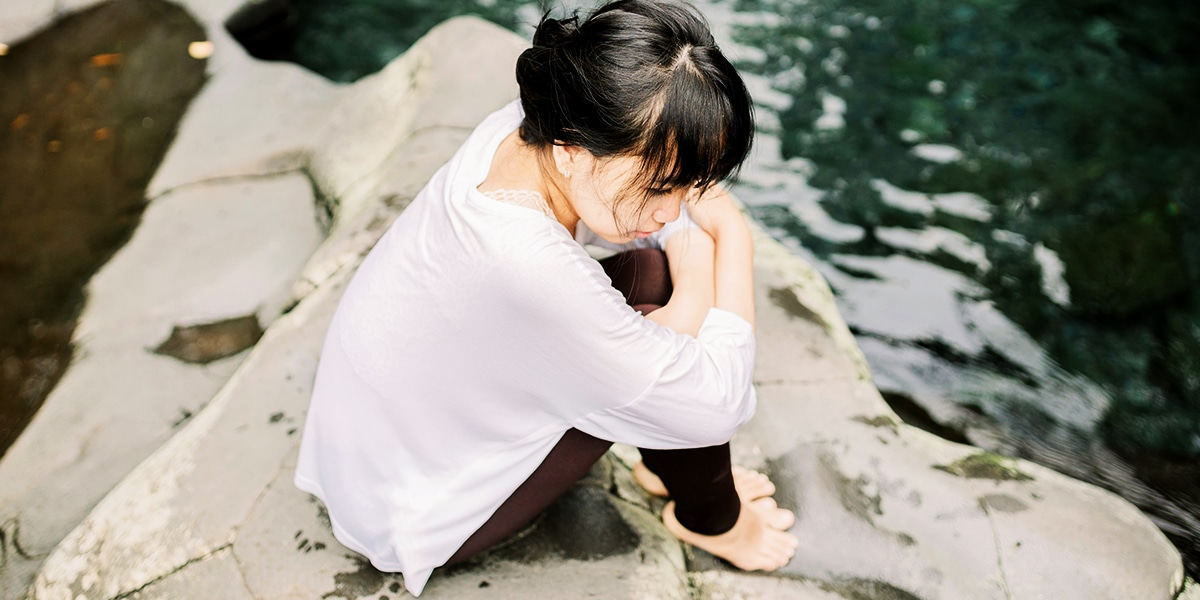Loving his wife, being father to their children—these are moments of grace for a prayerful man.
Well, my first prayers as a parent were before I was a parent because my slight, extraordinary, mysterious wife and I had been told by a doctor, bluntly and directly and inarguably, that we would not be graced by children, and I remember us walking out of the doctor’s office, silently, hand in hand, and then opening the passenger door to our car for my wife, as my mother had taught all her sons to do or else she, my mom, would reach up and slap you gently on the back of the head for being a boor, and I helped my wife into the car, and bent down to escort the hem of her blue raincoat into the car before closing the door gently, and then I started to walk around to the driver’s side, and I burst into tears, and bent over the trunk of the car, and sobbed for a moment.
My first prayers as a parent, those tears.
Then we prayed for a long time in all sorts of ways. I prayed in churches and chapels and groves and copses and hilltops and on the rocky beaches of the island where we lived at that time. I would have prayed to all the gods who ever were or ever would be except I know somehow deep in my heart that there is one Breath, one Imagination, one Coherent Mercy, as a friend of mine says, and that everything that is came from and returns to That which we cannot explain or understand, but can only try to perceive the spoor, clues, evidence, effect, the music in and through and under all things.
I have never thought that prayers of request can be answered; I do not think that is the way of the Mercy. Yet we do whisper prayers of supplication; I think we always have, since long before our species arrived in this form. Sometimes I think that beings have been praying since there were such things as beings; I suspect all beings of every sort do pause and revere occasionally, and even if we think, with our poor piddly perceptive apparatus, that they are merely reaching for the sun, or drying their wings, or meditating in the subway station between trains, or chalking the lines of a baseball field ever so slowly and meticulously, perhaps they are praying in their own peculiar, particular ways. Who is to say? Who can define that which is a private message to an Inexplicable Recipient? So that he who says a scrawny plane tree straining for light in a city alley is not a prayer does not know what he is saying, and his words are wind and dust.
The Target of My Prayers
Three children were granted to us, a girl and then, together, one minute apart, two boys; and my prayers doubled, for now I knew fear and trepidation for them, that they would sicken and die, that they would be torn by dogs and smashed by cars; and I felt even then the shiver of faint trepidation that someday, if they grew up safely, and did not suffer terrible diseases, and they achieved adulthood, that they would be heart-hammered by all sorts of things against which I could not protect or preserve them; and so I did, I admit it, sometimes beg the Coherent Mercy, late at night, for small pains as their lot, for relatively minor disappointments, for love affairs that would break apart but not savagely, for work that they would like and even maybe love. In the end, I remember vividly, I boiled all my prayers as a parent down to this one: Take me instead of them. Load me up instead of them. Let me eat the pains they were served at their tables.
I don’t think I ever fully understood the deep, almost inexplicable love of the Christ for us, why he would accept his own early tortured death as a sacrifice, until I had been a father for a while.
Miracle of the Virgin Mary
Somehow, being a father also slowly but surely changed the target of my prayers over the years. Before we were granted children, I chatted easily and often with my man Yesuah ben Joseph, a skinny gnomic guy like me, a guy with a motley crew of funny, brave, hardworking, boneheaded friends, a guy who liked to wander around outdoors, a guy who delighted in making remarks that were puzzling and memorable and riddlish, a guy—I felt like I knew him pretty well, what with us both being guys and all, and I had confided stuff to him not only as a child, but again after the years during which every Catholic boy in my experience ran screaming and shouting away from the Church, away from authority and power and corporate corruption and smug, arrogant, pompous, nominal bosses issuing proclamations and denouncing dissent.
You tiptoe back toward religion, in my experience, cautiously and nervously and more than a little suspicious, quietly hoping that it wasn’t all smoke and nonsense, that there is some deep wriggle of genius and poetry and power and wild miracle in it, that it is a language you can use to speak about that for which we have no words; and in my case, as in many others I know, this was so, and I saw for the first time in my life that there were two Catholic Churches, one a noun and the other a verb, one a corporation and the other a wild idea held in the hearts of millions of people who are utterly disinterested in authority and power and rules and regulations, and very interested indeed in finding ways to walk through the bruises of life with grace and humility.

So when I tiptoed back into Catholicism, and began taking it seriously, and began exploring and poking under the corporate hood, curious and fascinated by the revolutionary genius under the Official Parts, it was because I was a father, and knew that I needed a language with which to speak to my children of holiness and prayer and miracle and witness and hope and faith. I found, as my children grew from squirming lumps to toddlers and willowy young people and now almost men and woman, that it was to her that I turned, both in desperation and in cheerful, silent moments when I chanted the Hail Mary to myself while waiting for the coffee to brew.
Why? Because, I think, she was a mother—is a mother. He came out of her. That was a miracle. It is a miracle when a child emerges from his or her mother. I had seen this miracle not once but twice, with my own eyes, from very close to the field of action, and I think something awoke in me after that, something that knew she was there, available, approachable, patient, piercing. Not once in the days since my children were born have I ever felt her absence. I do not say this in a metaphorical way, or as a cool literary device, or as a symbolic hint. I mean what I said. I feel her near us.
I have no opinion about visitations, other than to grin at the ones where people see her face in tortillas and on stop signs, and to wonder quietly about ones like that which occurred to Juan Diego on the Hill of Tepeyac, long ago, that poor man who had to return to the hill for proof to offer the ecclesiastic authority, who gaped when a shower of roses fell to the shivering floor. Perhaps most reports are hallucinations; perhaps all of them. But perhaps hallucinations are illuminations, and there are countless more things possible than we could ever dream.
One thing I know at this age: If you think you know the boundaries and limits and extents of reality, you are a fool. Thus we pray.
A Prayer for My Children
I still pray for them every day. So does my wife, in the morning, by the bed, on her knees, in her pajamas, with her face pressed down upon the blanket of the bed, abashed before the light of the Lord. I have seen this, though I try to be out of the bedroom so that she can pray in private; and every time I see it I get the happy willies, that she believes with such force and humility. But I pray on my feet, by the coffee pot, while walking, while waiting for eyeglasses, while stirring the risotto, while washing the dishes, while brushing my teeth, while scratching the dog. I pray that they will be happy.
I pray that they will find work that is play. I pray that their hearts will not be stomped on overmuch—enough to form resilience, but not enough to crush their spirits. I pray that they will live long and be blessed by married love and be graced by children and maybe even grandchildren. I pray that their minds hum and sing and do not stutter and fail. I pray that they will not be savaged by illnesses, but be allowed to live healthy and happy for years beyond my ken and my own life. I still pray to die before they do. I still say thank you, every day, every single day, for being granted children at all; for I am a man who was told, bluntly and directly and inarguably, that my extraordinary bride and I would not be graced by children, and we walked out of the doctor’s office, silently, hand in hand, and we wept. Our first tears as parents.
I pray on my feet, by the coffee pot, while walking, while waiting for eyeglasses, while stirring the risotto, while washing the dishes. I still say thank you, every day, every single day.
We have cried many tears since, for many reasons, and our children have been tumultuous, and troubled, and in great danger, and our marriage has been wonderfully confusing, and troubled, and in great danger. But even now, all these years later, every few weeks I will find myself in tears for what seems like no reason at all; and I know it is because we were blessed with children, three of them, three long, wild prayers; and they are the greatest gifts a profligate Mercy ever granted shuffling, muddled me.
When I am in my last hour, when I am very near death, when I am so soon to change form and travel in unaccountable ways and places, I hope I will be of sound enough mind to murmur this to our three children, and perhaps, if the Mercy has been especially ridiculously generous, our grandchildren: It was for you that I was here, and for you I prayed every day of your life, and for you I will pray in whatever form I am next to take. Lift the rock, and I am there; cleave the wood, and I am there; call for me, and I will listen; for I hope to be a prayer for you and yours long after I am dust and ash. Amen.








